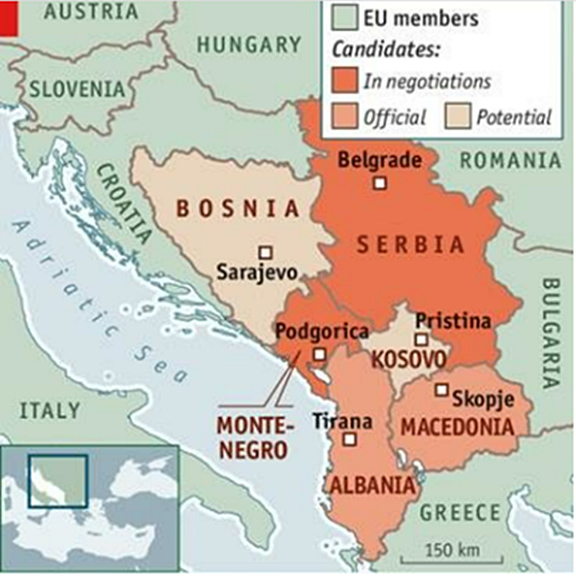In the past decade, the increase in regional cooperation, following the conflicts in the 1990s, has been one of the greatest recent achievements of the WB and in line with this the WB6 aim to build a Common Regional Market, based on EU rules and standards. Establishing the Common Regional Market will contribute to putting the region on the map for global investors seeking to reduce the distance to the EU markets and diversify their suppliers, thereby creating jobs, offering greater choices at lower prices for its consumers, and enabling people to work throughout the region.
The Action Plan for a Common Regional Market (CRM) is to be implemented by the end of 2024 and is made up of targeted actions that will lead, between others, to upgrade the industrial base and innovation infrastructures seeking to progress, among others, the inclusion in international supply chains and value chains being indispensable to support the development of agro-food industry in the region in line with the EU standards.
The European Commission aims to facilitate the progressive alignment of the plant health status, the priorities for pest control intervention and the pest outbreak and alert response preparedness of the Western Balkans to the higher EU standards. It will contribute to achieving the eradication/containment or confirmed pest freedom of Union quarantine pests, priority pests in particular, in the Western Balkan region. This will protect the EU and ensure a proper functioning of the internal market from the moment the Western Balkans are ready to join the EU. Once they are an EU Member State, they will be able to trade in the internal market without restrictions linked to their plant health status.”
Other related Plant Health Project in the region
PROJECT NAME: EU funded; IPA 2016. “Support to food safety, veterinary and phytosanitary standards”
BENEFICIARY INSTITUTION: Ministry of Agriculture
OBJECTIVE: The overall objective of the project is “to contribute to the increased protection of human, animal and plant health at every stage of the food production process, through the establishment of institutional and administrative capacities in line with the overall public administration reform agenda”
BENEFICIARY INSTITUTION: Ministry of Agriculture
OBJECTIVE: The overall objective is to increasing the ability of the Albanian authorities to increase performance in relation to inspection and controls in plant material and veterinary products.
PROJECT NAME: World Bank
Climate resilience agriculture sector
BENEFICIARY INSTITUTION: Ministry of Agriculture
OBJECTIVE: The overall objective is to increase competitiveness and climate resilience of priority agri-food value chains.
PROJECT NAME: EU Twinning. EU4PHYTO project „Further strenghtening of capacities of phytosanitary sector in the fields of plant protection products, plant health and seed and seedlings, including phytosanitary laboratories and phytosanitary inspections“
OBJECTIVE: The overall objective is to strenghten the capacities of phytosanitary sector in the fields of plant protection products, plant health and seed and seedlings, including phytosanitary laboratories and phytosanitary inspections in collaboration of EU Member States (Italian and Polish public institutions). The BiH plant health Institutions are expected to address these challenges, with regard to phytosanitary and plant protection issues.
COUNTRY / IES: North Macedonia
PROJECT NAME: EU Twinning Project MK 19 IPA AG 01 21. “Improvement of the administrative and operational capacities of the plant protection authorities”
BENEFICIARY INSTITUTION: Ministry of Agriculture
OBJECTIVE: The main objective of the project is to improve the administrative and operative capacities of the plant protection authorities in North Macedonia. To reach the overall project objective and the high level of harmonization with the acquis, the activities are focused on three main Components:
Component 1: Policy and legal framework development
Component 2: Management, Phytosanitary policy and its communication
Component 3: Risk-based official controls and other official activities. The areas covered by the project are plant health, plant protection products, quality of seeds and propagating material and plant variety right
COUNTRY / IES: Western Balkan
BENEFICIARY INSTITUTION: Ministry of agriculture and wide range stakeholders relevant for trade and phytosanitary
OBJECTIVE: The overall objective is to support the implementation of trade reforms in CEFTA economies in line with the requirements in the EU alignment process. The implementation of CEFTA AP5 and the trade pillar of the MAP REA is supported by 3 concrete reform measures. The main goal of the project is an assessment of the situation in the CEFTA Parties in the areas of plant health and food safety in the context of the individual Parties’ preparations towards full and effective implementation of the CEFTA’s “Decision for trade facilitation for fruit and vegetables”. Overall, the Project concludes that in all the CEFTA Parties relevant Competent Authorities (CAs) have been established, be it as a single governmental organization/institution that covers both plant health and food safety issues, or as at least two separate organizations/institutions.
COUNTRY / IES: Western Balkan
BENEFICIARY INSTITUTION: Ministry of Agriculture
OBJECTIVE: The overall objective is to improve animal health in the WB by enhancing the capacity of the Veterinary services concurrently with establishing cooperation between Animal and Plant Health Services; To develop an Animal Health Control system aligned with EU standards that comply with the accession requirements; To become approved for export of certain commodities to the EU and become recognized with free status from listed animal diseases by the World Organisation for Animal Health

